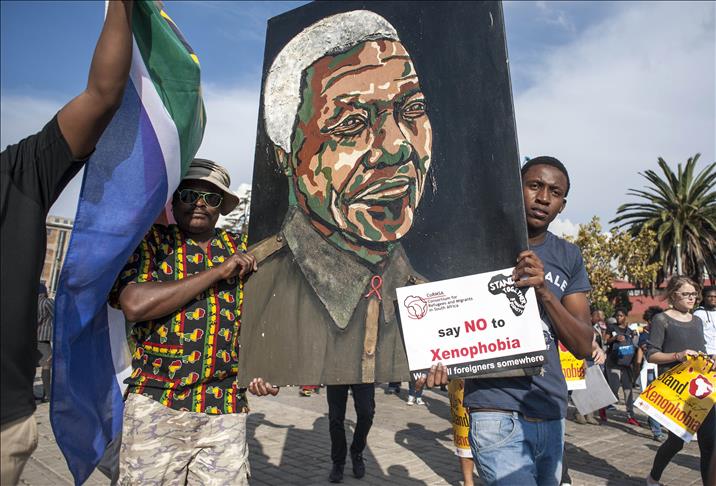
By Hassan Isilow
PRETORIA
South Africans on Monday celebrated Freedom Day, commemorating the country's first post-apartheid democratic elections, with President Jacob Zuma urging his compatriots to abandon violence inherited from the apartheid era.
"We need to do more to promote healing and tolerance amongst all our people," Zuma told a Freedom Day event in Pretoria, commemorating 21 years since the country's first non-racial national elections.
He said South Africa was commemorating Freedom Day against the background of recent anti-immigrant violence.
"Seven people were killed during horrific attacks that were directed at foreign nationals in Durban and Johannesburg," said Zuma.
He added that the dead had included three South Africans.
The violence began earlier this month in Durban, where mobs descended on the homes and shops of a number of foreign migrants.
The victims were accused of stealing jobs from native South Africans, committing crimes, and putting a burden on the country's social services.
The violence has forced scores of migrants from Malawi, Mozambique, Zimbabwe and other African countries to leave South Africa.
"We strongly condemn these attacks," said Zuma. "They have no place in a democracy, where people are free to express their unhappiness about any issue."
He extended his government's deepest condolences to victims' families, asserting that police had been instructed to work tirelessly to bring the killers to justice.
Zuma applauded his countrymen for coming out in their thousands over the past week to condemn the anti-immigrant violence.
Inherited violence
He contended, meanwhile, that whenever South Africans protested to express their grievances, some would resort to burning car tires and destroying public and private property instead of voicing their complaints peacefully.
"If they are asking for services, they destroy other services," he lamented.
The South African leader said the white minority apartheid regime had been a violent system that made South Africans react to it violently.
He regretted, however, that after the country attained democracy in 1994, the culture of violence was never addressed.
"We need a physiological cure as a country to drop this anger," insisted President Zuma.
He said the violence was not limited to ordinary South Africans, but could also be found among politicians.
"Look at the politicians you voted for. How angry they are in parliament," Zuma added without mentioning names.
But the rebuke seemed to be directed at the opposition Economic Freedom Fighters party (EFF), whose MPs have disrupted Zuma's parliamentary appearances at least twice.
They have been thrown out of parliament on several occasions for not adhering to parliamentary rules.
"When the speaker of parliament says 'sit down,' you must sit down. But what do they say? 'Speaker, I want to address you'," said Zuma, sending the audience into a fit of laughter.
"Our nation-building and healing efforts require more enthusiasm and the involvement of every sector of society," he insisted.
Tough immigration
President Zuma said his government would take measures to improve security by deploying the army to patrol the borders.
"Members of the South African National Defense Forces (SANDF) will also be deployed as immigration officers to improve the capacity of the Department of Home Affairs at the border posts," he said.
Zuma asserted that the Department of Home Affairs was developing a new international migration policy to be released for public comment in early 2016.
"The new policy will take into account recent experiences," he asserted.
Some claim there are as many as 5 million foreign migrants in the country, including 3 million Zimbabweans.
But according to the African Institute for Migration and Society (formerly known as the Forced Migration Studies program), there are between 1.6 and 2 million documented and undocumented migrants living in South Africa.
Most of these are accounted for by migrants from Southern African Development Community (SADC) member states, especially Zimbabwe.
Zuma said his government firmly believed that the African Union's efforts to promote peace, stability and democracy on the continent would in the long run reduce the need for people to migrate southward.
"The promotion of intra-Africa trade, regional integration, infrastructure and other economic interventions is also designed to improve the economic situation in sister countries," he added.
Zuma voiced hope that people from Africa would someday no longer need to leave their countries in search of greener pastures.
"Our hearts go out to the families of the hundreds of Africans who perished in the Mediterranean while trying to migrate to Europe in search for a better life," he said.
Zuma described the latest incident as a painful tragedy that served to highlight the conditions that forced Africans to undertake dangerous journeys to build better futures for themselves and their families.
Hundreds of people have drowned in the Mediterranean Sea in recent months during desperate attempts to reach Europe.
Anadolu Agency website contains only a portion of the news stories offered to subscribers in the AA News Broadcasting System (HAS), and in summarized form. Please contact us for subscription options.



